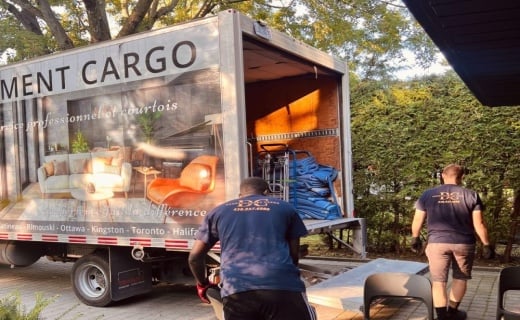Yes, it still happens quite a lot. Relocating across state lines in the U.S. is challenging enough, but moving to Quebec introduces a whole new level of logistics and cultural adaptation. From adjusting to French-speaking communities, understanding consumer protections, to planning the logistics of a long-distance move, there are many nuances that can make or break the experience.
If you’re planning to relocate to Quebec for work, studies, or family, here’s what not to forget. It blends practical moving logistics with local laws, consumer protections, and cultural tips every US expat needs to know.
Do your homework on moving companies
Choosing a moving company is one of the first and most important steps. In Quebec, as in the U.S., not all movers operate with the same level of professionalism. The Office de la protection du consommateur (OPC) provides detailed guidance on how to select a trustworthy mover, which you can review here: OPC moving advice
Recommendations include:
- Get referrals from people you trust instead of answering classified ads or online offers.
- Shop around (compare 2-3 companies) for transparency and pricing
- Verify insurance. Reputable movers have at least $1 million in liability insurance, which covers you if your items are damaged or someone is hurt during the move.
- Verify registration with the Commission des transports du Québec if heavy trucks are used. A reputable local moving company such as Déménagement Cargo illustrates how professional movers in Quebec clearly outline services, maintain insurance, and provide transparent pricing.
Understand contracts and payments
You might be accustomed to contracts being optional for smaller moves in the U.S., but in Quebec, written agreements are highly recommended. Movers are legally required to give you a written contract within 15 days if you agree to something online or over the phone.
Things to note:
- Don’t pay big deposits If you’re asked to pay more than two months in advance, make sure the money is kept in a trust account.
- Get everything in writing. Verbal promises are worth less if things go wrong.
- Demand transparency on extra costs like stairs, elevators, or long carry distances.
By securing everything in writing, you protect yourself against unexpected costs or service failures.
Plan ahead for moving day
The day of the move often brings surprises, especially when relocating internationally. To avoid stress, plan your logistics with military precision.
- Inventory your belongings before packing, and take photos of valuable items.
- Reserve elevators and parking spaces at both the origin and destination buildings.
- Prepare appliances by disconnecting them and securing protective parts.
- Pack valuables separately and move them yourself if possible.
- Expect weather issues. Quebec’s climate means snow and rain can complicate moves at almost any time of year. Always have a backup plan.
The more you anticipate, the less likely you’ll be caught off guard.
Don’t just budget for the moving truck
Moving to Quebec is more than just paying for a moving truck. Hidden costs pop up after the process has started. You might have to deal with customs forms at the border if you’re carrying items that need to be declared. Moving into a new home also typically involves paying deposits for electricity, gas, internet, and phone services. Some movers find they have to pay to get rid of furniture that won’t fit in the truck or the new house. For some Americans, paying for language lessons or translation services is a necessity to make life easier. By considering these extra costs, you’ll be more prepared and not surprised by unexpected expenses in your first weeks in Quebec.
Address change and services set up
Changing your address in Quebec is simplified with a single point of contact through Services Québec to inform several government departments at once. But there are other places you’ll need to reach out to directly. Banks, insurance companies, health care providers need to know your new information. Gym memberships, streaming subscriptions, local services: transfer or cancel in advance. Internet and cable companies in Quebec can get busy, especially during the summer moving season, so contacting them early is a good idea to avoid delays. By being proactive with these notifications, you’ll ensure a smoother move and have essential services like electricity, heating, and internet set up by the time you move in.
Safeguard your consumer rights
In Quebec, the Office de la protection du consommateur (OPC) advises and acts when things go wrong. It’s not unusual to have problems with movers who show up late with no explanation, tack on extra fees, or damage furniture and appliances. If a business doesn’t honour its contract, you can send a mise en demeure and take it to small claims court. The OPC can also tell you if a mover has a complaint record, adding another layer of protection before and after your move. For Americans unaccustomed to Quebec law, this consumer protection system provides reassurance and a path to assert your rights.
Cultural and practical adjustments
Beyond logistics, moving to Quebec means adapting to cultural norms. Here are some points that U.S. newcomers often overlook:
- Language: French is the official language, and most documents, contracts, and government interactions will be in French. While many Quebecers speak English, especially in Montreal, learning basic French will make daily life far smoother.
- Housing market: The majority of leases in Quebec start on July 1st, known as “Moving Day.” This tradition creates extremely high demand for movers and rentals during that period. If possible, schedule your move outside that window.
- Banking and credit: Credit history doesn’t always transfer seamlessly across the border. Be prepared to show proof of income or open new lines of credit in Canada.
- Health care: Quebec’s public health care system requires registration. There may be a waiting period before coverage begins, so keep U.S. health insurance active during the transition.
Insurance and liability
Moving companies in Quebec are required to have insurance, but you should also check if your homeowners or renters insurance covers international moves. To be safe, verify the mover’s liability coverage and ask if they provide replacement value protection for valuable items. If you have antiques, art, or fragile electronics, consider buying additional moving insurance for peace of mind.
Getting settled after the move
Unpacking the boxes isn’t the end of the job. To integrate into Quebec life, you’ll need to complete a few last steps:
- Apply for a health card (RAMQ).
- Get a Quebec driver’s license within the time limit.
- Learn recycling and trash collection rules, which are different from many U.S. cities.
- Join community groups or language meetups to make the cultural adjustment smoother.
What if something goes wrong ?
Even with planning, things can go wrong. If your mover breaks stuff, adds fees, or no-shows, don’t freak out.
- Attempt to negotiate with the company directly.
- Send a demand letter for payment.
- Get damage assessed professionally to back up claims.
- Complain to the OPC if the mover is uncooperative
- Sue in small claims court if you have to – it’s cheap and made for consumers.
- Knowing these options gives you peace of mind during the move.
Don’t forget
Moving from the United States to Quebec is an experience that is both exciting and hard. It is possible to make the shift far less stressful by taking the time to carefully select a moving company, obtaining written contracts, and getting yourself ready for the specific realities of living in Quebec.
We hope you found this blog post What You Shouldn’t Forget When Moving to Quebec, useful. Be sure to check out our post 5 Tips To Adjust In a New Country for more great tips!
Have Experience in the Moving Industry? Want an Additional Income Stream? Work With All Around Moving!
Adding a new revenue stream to your company is a great method to increase earnings. Every step of the journey as a moving consultant, we’ll be there for you. Click here to learn more.






